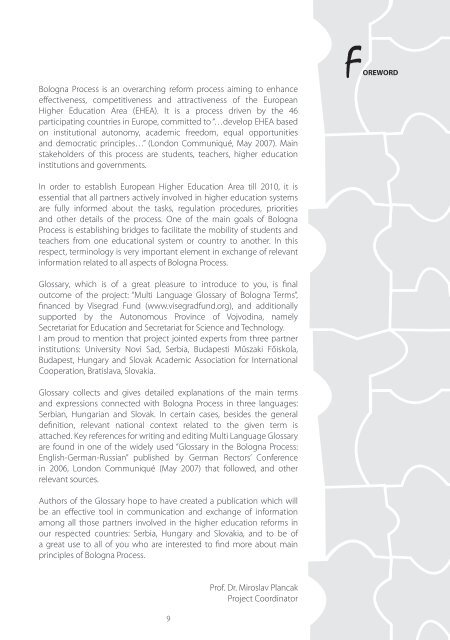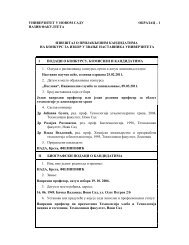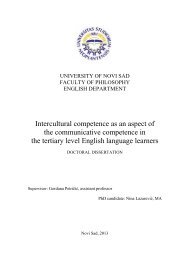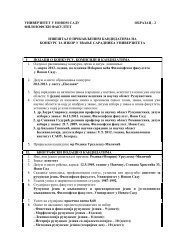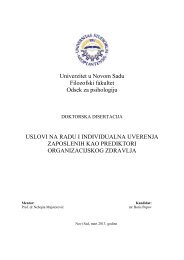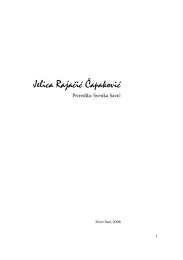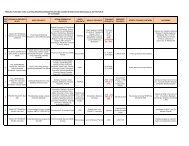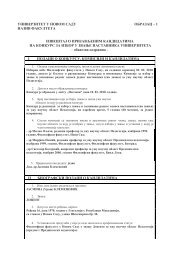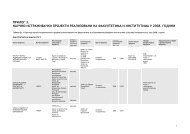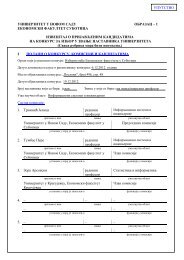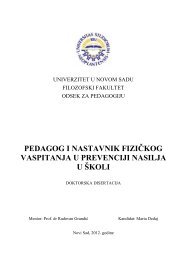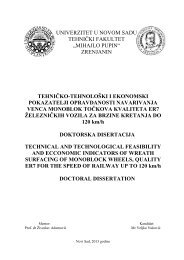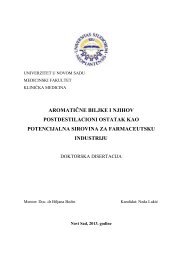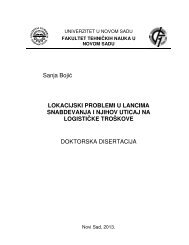ViÅ¡ejeziÄni reÄnik pojmova o Bolonjskom procesu na srpskom ...
ViÅ¡ejeziÄni reÄnik pojmova o Bolonjskom procesu na srpskom ...
ViÅ¡ejeziÄni reÄnik pojmova o Bolonjskom procesu na srpskom ...
Create successful ePaper yourself
Turn your PDF publications into a flip-book with our unique Google optimized e-Paper software.
Fo r e w o r d<br />
Bolog<strong>na</strong> Process is an overarching reform process aiming to enhance<br />
effectiveness, competitiveness and attractiveness of the European<br />
Higher Education Area (EHEA). It is a process driven by the 46<br />
participating countries in Europe, committed to “…develop EHEA based<br />
on institutio<strong>na</strong>l autonomy, academic freedom, equal opportunities<br />
and democratic principles…” (London Communiqué, May 2007). Main<br />
stakeholders of this process are students, teachers, higher education<br />
institutions and governments.<br />
In order to establish European Higher Education Area till 2010, it is<br />
essential that all partners actively involved in higher education systems<br />
are fully informed about the tasks, regulation procedures, priorities<br />
and other details of the process. One of the main goals of Bolog<strong>na</strong><br />
Process is establishing bridges to facilitate the mobility of students and<br />
teachers from one educatio<strong>na</strong>l system or country to another. In this<br />
respect, terminology is very important element in exchange of relevant<br />
information related to all aspects of Bolog<strong>na</strong> Process.<br />
Glossary, which is of a great pleasure to introduce to you, is fi<strong>na</strong>l<br />
outcome of the project: “Multi Language Glossary of Bolog<strong>na</strong> Terms”,<br />
fi<strong>na</strong>nced by Visegrad Fund (www.visegradfund.org), and additio<strong>na</strong>lly<br />
supported by the Autonomous Province of Vojvodi<strong>na</strong>, <strong>na</strong>mely<br />
Secretariat for Education and Secretariat for Science and Technology.<br />
I am proud to mention that project jointed experts from three partner<br />
institutions: University Novi Sad, Serbia, Budapesti Műszaki Főiskola,<br />
Budapest, Hungary and Slovak Academic Association for Inter<strong>na</strong>tio<strong>na</strong>l<br />
Cooperation, Bratislava, Slovakia.<br />
Glossary collects and gives detailed expla<strong>na</strong>tions of the main terms<br />
and expressions connected with Bolog<strong>na</strong> Process in three languages:<br />
Serbian, Hungarian and Slovak. In certain cases, besides the general<br />
definition, relevant <strong>na</strong>tio<strong>na</strong>l context related to the given term is<br />
attached. Key references for writing and editing Multi Language Glossary<br />
are found in one of the widely used “Glossary in the Bolog<strong>na</strong> Process:<br />
English-German-Russian” published by German Rectors’ Conference<br />
in 2006, London Communiqué (May 2007) that followed, and other<br />
relevant sources.<br />
Authors of the Glossary hope to have created a publication which will<br />
be an effective tool in communication and exchange of information<br />
among all those partners involved in the higher education reforms in<br />
our respected countries: Serbia, Hungary and Slovakia, and to be of<br />
a great use to all of you who are interested to find more about main<br />
principles of Bolog<strong>na</strong> Process.<br />
9<br />
Prof. Dr. Miroslav Plancak<br />
Project Coordi<strong>na</strong>tor


